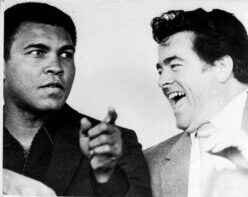The Second Lawyers – Needham & James
I had lost my position at my beloved club and was being blamed by the town for the club being relegated when I’d seen them brought low without a fight. I realised that my solicitors were massively at fault for letting Shooter have all the documents enabling him to fabricate a case. I could no longer fight for them as an insider, but as a fan I could do more – if I had the right advice…
In the safe hands of my lawyer: possibly the most dangerous place in the world.
Varley Hibbs (VH) had not been up to the job,
They had neither the experience nor the capability to handle my case, and should have admitted this at the outset.
I went through my files and made a list of 43 points of complaint about how VH had handled my case. Each point was supported by specific examples, all were evidenced in correspondence.
Beyond the fact that VH were neither qualified nor experienced enough to take on my case in the first place, I’ll restrict my account here to three important aspects.
1. VH should have challenged the injunction in the first place
On 16 February 1987, when I was served the injunction, any capable solicitor would have done what I now know to be the only obvious course of action: challenge the injunction. This is a standard response which would have bought me time – at least 7 days – to present reasons why I should not have been prevented from fulfilling my role as director and chairman. I didn’t know this; I’m a layman. VH should have known this, but they didn’t. Like rabbits in the headlights of a speeding juggernaut, they froze, then simply bowed to the demands of my opponents.
2. VH should not have told me to hand over all information.
The way I was made to hand over 10 years’ of books and records to Shooter’s solicitor was disgraceful. The injunction demanded that the documents be given to a neutral party, with any inspection allowed only under strict supervision. VH should have ensured that this was done.
Instead, Shooter and Broadhurst were given open access to vital paperwork, to study in private at their leisure. VH did not even see the need to copy the files before handing them over! I had insisted on this, but they argued that the cost would be prohibitive and it would “take too long” – they were being bullied and seemed happy to play the victim.
Hardly surprising then, that documents which would have cast a positive light on the way I had handled the company’s affairs, were missing when the files appeared in court.
The day all the club records were handed over to Shooter was the day I lost the case.
If the correspondence file had been kept intact, it would have held minutes of the two EGM’s called to float new shares, showing 97 per cent attendance at each meeting, and unanimous votes in favour of issue of new shares. Everyone at that time was fully behind the football club, and my approach to keeping it alive and moving it forward.
3. After losing the case, VH should have pushed for an appeal within 3 months. They didn’t!
Clearly, VH lacked the knowledge, experience, and ability to handle my case.
I appointed VH on the understanding that senior partner Mike Holbrook would represent me. Instead I was given Alan Lodge, who I had never met. He may have trained in litigation, but he admitted himself that he had never handled a serious case like this before. I knew nothing of this world – little was I to know at the time how serious that was.
When Lodge left VH in 1990 he joined another local firm, Newsome Vaughan, and was presented as specialising in civil litigation and accident claims. This clearly wasn’t an upward step for a man with High Court litigation experience.
I was recommended to approach Needham and James of Stratford on Avon (N&J), to help me lodge a complaint against Varley Hibbs.
I met with Sat Bahia who told me the first step for N&J was to retrieve my files.
Sat requested all files from VH – and I imagined these would turn up within a matter of days. I had seen how organised the files were, when dozens of them had been laid out on tables in the High Court. I knew I must have been VH’s biggest client, both in terms of quantity of files and amounts billed per year for a number of years. Surely all they had to do was to go to their archives and extract my files…
Pieces of paper began to arrive at N&J’s office, but not in the bulk delivery I had anticipated. Instead, they arrived in dribs and drabs over a period of months. VH said they were making copies for their own reference. Ah, if only they had thought of that when handing Nuneaton Borough’s files to Shooter!
I’d now had years of experiencing how solicitors – in particular VH – could be very slow to act, but this was ridiculous. It was clear to me that VH were taking so long because they were vetting and editing their files. They would not have been able to remove correspondence; they knew that I had retained my own copies of all letters. But what was important to my case – and within my right to request – was file notes of all telephone conversations and meetings, that would get a true indication of how my case was being handled – or mishandled.
So I challenged Sat to get the files quickly, and his reaction – acceptance of VH’s conduct – should have been the first warning sign. In hindsight, I was being hung on a meat hook and left to swing in the wind.
